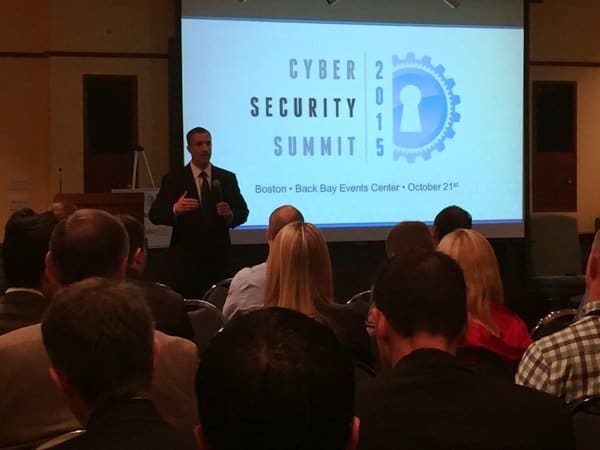FBI's Advice on Ransomware? Just Pay The Ransom. | The Security Ledger

FBI Boston’s Joseph Bonavolonta said that paying the ransom is often the easiest path out of ransomware infections.
In-brief: The nation’s top law enforcement agency is warning companies that they may not be able to get their data back from cyber criminals who use Cryptolocker, Cryptowall and other malware without paying a ransom.
The FBI wants companies to know that the Bureau is there for them if they are hacked. But if that hack involves Cryptolocker, Cryptowall or other forms of ransomware, the nation’s top law enforcement agency is warning companies that they may not be able to get their data back without paying a ransom.
“The ransomware is that good,” said Joseph Bonavolonta, the Assistant Special Agent in Charge of the FBI’s CYBER and Counterintelligence Program in its Boston office. “To be honest, we often advise people just to pay the ransom.”
Bonavolonta was addressing a gathering of business and technology leaders at the Cyber Security Summit 2015 on Wednesday at Boston’s Back Bay Events Center. He was referring to ransomware programs like Cryptolocker, Cryptowall, Reveton and other malicious programs that encrypt the contents of a victim’s hard drive, as well as other directories accessible from the infected system. The owner is then asked to pay a ransom – often hundreds of dollars – for the key to unencrypt the data.

FBI Boston’s Joseph Bonavolonta address the Cyber Security Summit on October 21st. Bonavolonta said that paying the ransom is often the easiest path out of ransomware infections. (Photo courtesy of FBI.)
Ransomware, in various forms, has been around for more than a decade. But the past three years has seen a steep rise in incidents involving the programs, which often infect users via malicious email attachments or drive by downloads from compromised websites or malicious web ads (malvertising). That has resulted in an increase in complaints to the FBI, said Bonavolonta. Police departments appear particularly prone to ransomware infections. But the problem has been widely noted. The infections can be difficult to remove, as this article from the Yuma Sun about a Cryptolocker infection in the newsroom notes.
The FBI issued a notice in June, which identified CryptoWall as the most common form of ransomware affecting individuals and businesses in the US. The Bureau said it had received 992 complaints related to CryptoWall between April 2014 and June 2015 with losses totaling $18 million. That message advised victims of ransomware to contact their local FBI field office.
Bonavolonta echoed that advice in his remarks on Wednesday, but also cautioned that the Bureau may not be able to pry encrypted data from the clutches of the ransomware authors, who use ultra secure encryption algorithms to lock up ransomed data.
“The easiest thing may be to just pay the ransom,”Bonavolonta, who said that efforts by the Bureau and others to defeat the encryption used by the malware did not bear fruit. “The amount of money made by these criminals is enormous and that’s because the overwhelming majority of institutions just pay the ransom.”
The success of the ransomware ends up benefitting victims: because so many people pay, the malware authors are less inclined to wring excess profit out of any single victim, keeping ransoms low. And most ransomware scammers are good to their word, Bonavolonta said. “You do get your access back.”
Still, the Boston head of cyber said that organizations that have procedures in place for regularly backing up their data can avoid paying a ransom at all, by simply restoring the infected system to a state prior to the infection.
And the FBI still wants to hear about ransomware infections, even from firms that pay the criminals off. “Do we want you to call the FBI? Yes,” said Bonavolonta. The FBI has been collecting information on ransomware scams and wants to be able to keep abreast of how the scams are evolving.
Like this:
LikeLoading...